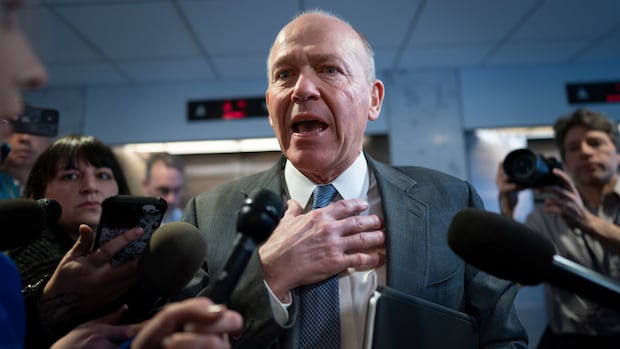U.S. lawmakers pressed Boeing’s chief executive Tuesday about the company’s latest plan to fix its manufacturing problems, and relatives of people who died in two crashes of Boeing 737 Max jetliners were in the room to remind him of what was at stake.
CEO David Calhoun appeared before the Senate investigations subcommittee, which is chaired by Sen. Richard Blumenthal, D-Conn., a Boeing critic.
Blumenthal opened the hearing by recognizing the relatives of the crash victims and the family of a Boeing whistleblower who died by suicide earlier this year.
“This hearing is a moment of reckoning,” the senator said. “It’s about a company, a once-iconic company, that somehow lost its way.”
Calhoun’s appearance before Congress was the first by a high-ranking Boeing official since a panel blew out of a 737 Max during an Alaska Airlines flight in January. No one was seriously injured in the incident, but it raised fresh concerns about the company’s best-selling commercial aircraft.
Calhoun sat at the witness table and fidgeted with his eyeglasses as Blumenthal spoke. Sen. Ron Johnson, R-Wisc., thanked the CEO for coming to face “tough questions.”
Before giving his prepared opening statement, Calhoun stood and faced the people in the audience holding poster-sized photos of some of the 346 people who died in the 2018 and 2019 crashes.
“I apologize for the grief that we have caused,” he said.
Potentially defective parts built into jets, claimed whistleblower
Hours before he was set to appear, the Senate panel released a 204-page report with new allegations from a whistleblower who said he worries that “non-conforming” parts — ones that could be defective or aren’t properly documented — are going into 737 Max jets.
Sam Mohawk, a quality assurance investigator at the 737 assembly plant near Seattle, claims Boeing hid evidence of the situation after the Federal Aviation Administration informed the company a year ago that it would inspect the plant.
“Once Boeing received such a notice, it ordered the majority of the [non-conforming] parts that were being stored outside to be moved to another location,” Mohawk said, according to the report. “Approximately 80 per cent of the parts were moved to avoid the watchful eyes of the FAA inspectors.”
Boeing CEO Dave Calhoun will step down from the embattled plane maker at the end of the year as part of a broader management shuffle. The president and CEO of Boeing’s commercial airplanes unit is also out and the board chair said he doesn’t plan to seek re-election.
The parts were later moved back or lost, Mohawk said. They included rudders, wing flaps and tail fins — all crucial in controlling a plane.
During his testimony, Calhoun said he had not directly spoken to any whistleblowers.
Boeing is “no longer what it used to be years ago,” said aviation safety consultant Robert Ditchey in an interview with CBC News ahead of Calhoun’s testimony.
“They don’t manufacture very much anymore, they just assemble,” said Ditchey. “So they they contracted that stuff out, which means in its essence, Boeing doesn’t have control over it. They can’t.”
He said that the solution to Boeing’s problems is “major surgery” — hiring executives with a background in engineering and who understand how airplanes are built.
“Boeing used to be led by engineers who knew and understood airplanes. They knew how to make airplanes. The CEO knew how to make an airplane years ago. Today, they have no idea,” he said.
Boeing reviewing the claims
A Boeing spokesperson said the company got the subcommittee report late Monday night and was reviewing the claims.
“We continuously encourage employees to report all concerns as our priority is to ensure the safety of our airplanes and the flying public,” the spokesperson said.
The FAA said it would “thoroughly investigate” claims raised in the Senate report.
The Current9:18Crisis of confidence at Boeing
Boeing CEO Dave Calhoun will step down later this year, after a string of incidents renewed concerns about the safety of the company’s planes. Washington Post reporter Lori Aratani walks us through the crisis of confidence shaking the manufacturer.
The Senate subcommittee said that newly uncovered documents and whistleblower accounts “paint a troubling picture of a company that prioritizes speed of manufacturing and cutting costs over ensuring the quality and safety of aircraft.”
The 737 Max has a troubled history. The Justice Department is considering whether to prosecute Boeing for violating terms of a settlement it reached with the company over allegations it misled regulators who approved the plane.
Max jets crashed in 2018 in Indonesia and 2019 in Ethiopia. The FAA subsequently grounded the aircraft for more than a year and a half.
Mohawk told the Senate subcommittee that the number of unacceptable parts has exploded since production of the Max resumed following the crashes.
He said the increase led supervisors to tell him and other workers to “cancel” records that indicated the parts were not suitable to be installed on planes.



